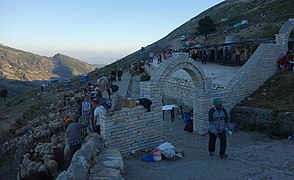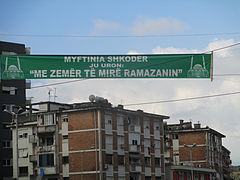Islam in Albania
Islam arrived in Albania mainly during the Ottoman period when the majority of Albanians over time converted to Islam under Ottoman rule, but Islam was introduced to Albanians back in the 8th century during trades. Following the Albanian National Awakening (Rilindja) tenets and the de-emphasis of religious tradition in Albania, all governments in the 20th century pursued a secularization policy, most aggressively under the People's Socialist Republic of Albania. Due to this policy, Islam, as with all other faiths in the country, underwent radical changes. Decades of state atheism, which ended in 1991, brought a decline in the religious practice of all traditions. The post-communist period and the lifting of legal and other government restrictions on religion allowed Islam to revive through institutions that generated new infrastructure, literature, educational facilities, international transnational links and other social activities.[2] According to a 2011 census, 56.7% of Albania's population adheres to Islam, making it the largest religion in the country.[3] For contemporary Muslims in Albania, Muslim religious practices tend to be minimal.[4] The remaining population belongs either to Christianity, which is the second largest religion in the country practiced by 16.99% of the population, or are irreligious.[5]
History[edit]
13th century[edit]
Albania came into contact with Islam in the 13th century when Angevin expansion into Albania during the reign of Charles I Anjou was made possible in part by Muslim involvement. Lucera is located only about 240 km northwest of Brindisi, which was the main port of disembarkation. Charles claimed rights in Albania, as Manfred's successor, since 1267 when the Treaty of Viterbo was drawn up. During the winter of 1271, the Angevin forces took Durrës. Within a year, Charles began to use the title "rex Albaniae", a title that was later recognized by the king of Serbia and the tsar of Bulgaria. In 1273 both Muslim and Christian contingents sailed across the Adriatic. In April 1273, a Muslim from Lucera named Leone was appointed captain of the Muslim forces in Durrës. A month later, Musa took Leone's place as commander of 200 Muslims stationed "in partibus Romaniae". Although relations between the Church of Rome and Byzantium improved, Charles I of Anjou continued to send Muslim and Christian military forces to the east, towards Albania. The Muslim knight Salem, a regular army officer, led 300 Lucerians - archers and lancers - to Vlora, in 1275. In September of that year, Ibrahim became the captain of the Muslims of Durrës, who took the place of Musa. On 19 April 1279, Charles I ordered 53 of the best Muslim archers from Lucera to be selected by the Capitanata's justiciary, Guy d'Allemagne, to go to Durrës. As usually happens in the recruitment process, the advice of Muslim military leaders was sought. Ibrahim had to approve the selections. Orders were given that Ibrahim could take four horses with him as he crossed from Brindisi to Durrës. Ibrahim served in Durrës again in the early 1280s, as did a man from Lucera, named Pietro Cristiano. One source identifies him as "de... terra Lucerie Saracenorum", most likely a Christian convert from Islam. The demand for Muslim carpenters and blacksmiths to build war machines in Albania was so great during the summer of 1280 that it threatened to exhaust the skilled workers' pool for the construction of forts on the Italian coast. In June 1280, the king ordered the archers of the Capitanata and the Land of Bari to send 60 Muslim archers, as well as carpenters, stonemasons and blacksmiths to Albania. The archers had to report to Hugues le Rousseau de Sully in Berat. In the fall of the same year, 200 archers from Lucera were sent to Vlora. At the beginning of December, 300 archers were stationed in Durrës. Angevin forces took part in the unsuccessful siege of Berat castle, and were repulsed by Byzantine forces.[6]
Controversies and current issues[edit]
Debates about Islam and contemporary Albanian identity[edit]
Within the Balkans apart from the ethno-linguistic component of Albanian identity, Albania's Orthodox neighbours also view it through religious terms.[67] They refer to Albanians as a Muslim nation and as Muslim fundamentalists, which has placed the secular part of Albanian identity under strain.[157][67]
Among Albanian intellectuals and other notable Albanians, many Muslim, this has generated much discussion and at times debates about Islam and its role within Albania and amongst Albanians as a whole in the Balkans.[158] Within these discourses, controversial Orientalist and biological terminology has been used by some Albanian intellectuals when discussing Islam and Albanians.[159][160]




